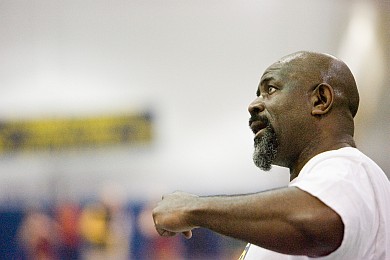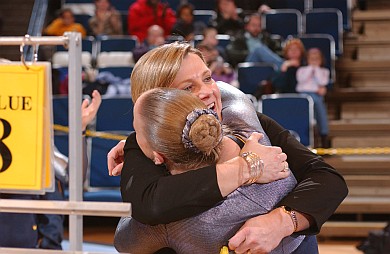
Click here for slideshow of U-M’s top coaches” />Hockey coach Red Berenson holds the NCAA record for most consecutive playoff appearances (19). His consistent success is just one example of U-M’s athletic excellence. Almost half of U-M’s athletics programs have won more Big Ten titles than any other team. It’s the result of building ‘a program that will last,’ as Berenson puts it, and ‘not just a winning team.’ (Photo: Scott Galvin, U-M Photo Services.) Click here for slideshow of U-M’s top coaches

Click here for slideshow of U-M’s top coaches” />James Henry, in 24 years as head coach for women’s track and field, has produced 100 All-American and 167 All-Big Ten athletes. His teams and individual athletes have won an astounding 129 Big Ten titles and six national championships. (Photo: Scott Galvin, U-M Photo Services.) Click here for slideshow of U-M’s top coaches
1: A little temporary blindness goes a long way
You might think it’s best to know everything about the job when you take over a Michigan program—but you’d be wrong. It turns out a little ignorance can be a wonderful thing.

Click here for slideshow of U-M’s top coaches” />’Every good program is bigger than any one season,’ says women’s gymnastics coach Bev Plocki. ‘Sticking by your principles might cost you in the short run, but you’ll be better off in the long run.’ (Photo: Martin Vloet, U-M Photo Services.) Click here for slideshow of U-M’s top coaches
2: Have a vision

Click here for slideshow of U-M’s top coaches” />Men’s basketball coach John Beilein recalls the time a former player told him, ‘Historically, I’ve had trouble getting to class on time.’ Beilein’s response: ‘Historically, those players have not made my team.’ (Photo: Scott Galvin, U-M Photo Services.) Click here for slideshow of U-M’s top coaches

Click here for slideshow of U-M’s top coaches” />’Even in a bad year a good program is a good program. And you spend years to get to that point,’ says softball coach Carol Hutchins, who has won 11 Big Ten coach of the year awards while leading the Wolverines to 12 conference titles and a national championship. (Photo: Scott Galvin, U-M Photo Services.) Click here for slideshow of U-M’s top coaches
3: Values before victories
Hutchins’ comment speaks to a larger truth: if you try to put victories before values, pretty soon you won’t have much of either. When Martin hires a new coach to take over teams that haven’t been successful recently, he’s been known to tell them, “You don’t have to win right away. In fact, if you do, we might be concerned.”Michigan’s top coaches tend to be very impatient about instilling the values they want to see in their charges—but that requires them to be far more patient waiting for the wins to come. It’s not only the right trade-off, it’s the smart trade-off. When the men’s basketball team didn’t control its boosters and players, the results were disastrous. Although the team got to the NCAA finals in 1992 and 1993, the booster payment scandal cost Chris Webber his reputation, head coach Steve Fisher his job, and the team years of probation. Ironically, even their victories disappeared when U-M retroactively “vacated” 170 games from five seasons and pulled down its Final Four banners from Crisler Arena.”Just as every good team is bigger than any one athlete,” Plocki says, “every good program is bigger than any one season. Sticking by your principles might cost you in the short run, but you’ll be better off in the long run.”Today, third year men’s basketball coach John Beilein remembers confronting one of his top players at a previous stop about his academic record. “It was practically a rap sheet: ‘September 14, late for class. September 16: late for meeting. September 17: missed exam.'”He said, and I quote: ‘Historically, I’ve had trouble getting to class on time.'”I said, ‘Historically, those players have not made my team.'”Beilein’s resolve was tested last season when the Wolverines were about to go into overtime at Iowa in a crucial contest. Michigan’s star player, Manny Harris, seemed less than enthusiastic about playing the extra period. So, Beilein benched him, knowing full well the fans and the press would crucify him if they lost—which they did. Beilein took the heat, but in the next game Harris led the team with 27 points in a huge win over nationally ranked Purdue, on the Wolverines’ way to their first NCAA berth in eleven years. “Happens all the time,” Hutchins says. “You can’t win with two sets of rules. When we have upheld that principle, and sent a star to the bench, we’ve had some of our best performances.”
4: Make Hay When the Sun Shines
At a lesser athletic department, winning would be an end in itself. At Michigan, the victories merely provide the means to build the infrastructure needed to stay on top. That’s why Berenson got his first renovation after winning his first NCAA title; Plocki’s gymnasts got the unequaled Shepherd Center after their 10th Big Ten title; and the softball and baseball teams built their beautiful ballparks after they both won titles in 2007. Rich Rodriguez defines it this way: “When you build a program, and you build it right, it’s built to last even after your gone,” he says. “Look at Michigan football. When I came in there were so many things that were already built into the foundation a long time ago by Fielding Yost, Fritz Crisler, Bo, Moe and Lloyd [Carr]. “Everything you see going up now—the new indoor facility, the stadium renovation—started before we got here. We don’t need fancier stuff than everyone else has, but those facilities needed to be upgraded for us to compete with the rest of the Big Ten in terms of recruiting and developing the best athletes. “And I like the message it sends to our players. I don’t want any sense of entitlement—they have to earn this privilege—but when they do, I want them to see that at Michigan, it’s not just talk. Everything really is first class. “Expectations come with that—and that’s good, too.”
5: Don’t get complacent
Most Michigan coaches say one of the hardest steps of building an enduring program is the last one: Staying on top. It’s always exciting to attack the castle. Defending it is harder. And when you’re Michigan, you show up to any game, match or meet with a target on your back. And, of course, college teams change every year. That can be a challenge—but also a blessing, because it forces coaches to keep things fresh. “Every team’s chemistry is different,” Plocki says. “When you look at them as all being the same, you take things for granted, and their performance starts to fall off. What works one season is not going to work the next.””I don’t think [staying hungry] is ever an issue with the coaches,” Beilein says. “But with our players it’s a constant challenge. We were hunters last year, we are hunters this year, and we will always be hunters as long as we’re playing at Michigan.”Add it all up, and Michigan has one more advantage few other schools can leverage. “Many coaches are on a career ladder, but at Michigan we are only trying to win for Michigan,” Hutchins says. “When coaches get to Michigan you’re not shopping around for the next job. Why would you want to go anywhere else? This is your last stop. And that’s why we take such an interest in each other’s programs, and try to help each other.”Once you find that, it’s special.”


